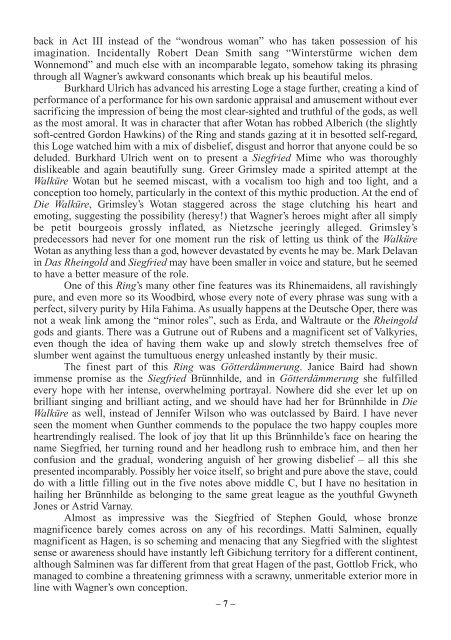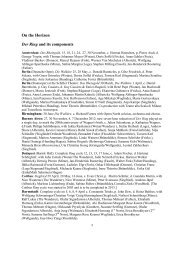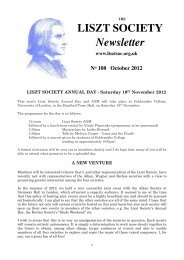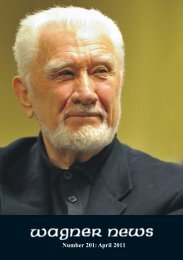(soprano) and DAVID SYRUS (piano) - Wagner Society of England
(soprano) and DAVID SYRUS (piano) - Wagner Society of England
(soprano) and DAVID SYRUS (piano) - Wagner Society of England
Create successful ePaper yourself
Turn your PDF publications into a flip-book with our unique Google optimized e-Paper software.
ack in Act III instead <strong>of</strong> the “wondrous woman” who has taken possession <strong>of</strong> his<br />
imagination. Incidentally Robert Dean Smith sang “Winterstürme wichen dem<br />
Wonnemond” <strong>and</strong> much else with an incomparable legato, somehow taking its phrasing<br />
through all <strong>Wagner</strong>’s awkward consonants which break up his beautiful melos.<br />
Burkhard Ulrich has advanced his arresting Loge a stage further, creating a kind <strong>of</strong><br />
performance <strong>of</strong> a performance for his own sardonic appraisal <strong>and</strong> amusement without ever<br />
sacrificing the impression <strong>of</strong> being the most clear-sighted <strong>and</strong> truthful <strong>of</strong> the gods, as well<br />
as the most amoral. It was in character that after Wotan has robbed Alberich (the slightly<br />
s<strong>of</strong>t-centred Gordon Hawkins) <strong>of</strong> the Ring <strong>and</strong> st<strong>and</strong>s gazing at it in besotted self-regard,<br />
this Loge watched him with a mix <strong>of</strong> disbelief, disgust <strong>and</strong> horror that anyone could be so<br />
deluded. Burkhard Ulrich went on to present a Siegfried Mime who was thoroughly<br />
dislikeable <strong>and</strong> again beautifully sung. Greer Grimsley made a spirited attempt at the<br />
Walküre Wotan but he seemed miscast, with a vocalism too high <strong>and</strong> too light, <strong>and</strong> a<br />
conception too homely, particularly in the context <strong>of</strong> this mythic production. At the end <strong>of</strong><br />
Die Walküre, Grimsley’s Wotan staggered across the stage clutching his heart <strong>and</strong><br />
emoting, suggesting the possibility (heresy!) that <strong>Wagner</strong>’s heroes might after all simply<br />
be petit bourgeois grossly inflated, as Nietzsche jeeringly alleged. Grimsley’s<br />
predecessors had never for one moment run the risk <strong>of</strong> letting us think <strong>of</strong> the Walküre<br />
Wotan as anything less than a god, however devastated by events he may be. Mark Delavan<br />
in Das Rheingold <strong>and</strong> Siegfried may have been smaller in voice <strong>and</strong> stature, but he seemed<br />
to have a better measure <strong>of</strong> the role.<br />
One <strong>of</strong> this Ring’s many other fine features was its Rhinemaidens, all ravishingly<br />
pure, <strong>and</strong> even more so its Woodbird, whose every note <strong>of</strong> every phrase was sung with a<br />
perfect, silvery purity by Hila Fahima. As usually happens at the Deutsche Oper, there was<br />
not a weak link among the “minor roles”, such as Erda, <strong>and</strong> Waltraute or the Rheingold<br />
gods <strong>and</strong> giants. There was a Gutrune out <strong>of</strong> Rubens <strong>and</strong> a magnificent set <strong>of</strong> Valkyries,<br />
even though the idea <strong>of</strong> having them wake up <strong>and</strong> slowly stretch themselves free <strong>of</strong><br />
slumber went against the tumultuous energy unleashed instantly by their music.<br />
The finest part <strong>of</strong> this Ring was Götterdämmerung. Janice Baird had shown<br />
immense promise as the Siegfried Brünnhilde, <strong>and</strong> in Götterdämmerung she fulfilled<br />
every hope with her intense, overwhelming portrayal. Nowhere did she ever let up on<br />
brilliant singing <strong>and</strong> brilliant acting, <strong>and</strong> we should have had her for Brünnhilde in Die<br />
Walküre as well, instead <strong>of</strong> Jennifer Wilson who was outclassed by Baird. I have never<br />
seen the moment when Gunther commends to the populace the two happy couples more<br />
heartrendingly realised. The look <strong>of</strong> joy that lit up this Brünnhilde’s face on hearing the<br />
name Siegfried, her turning round <strong>and</strong> her headlong rush to embrace him, <strong>and</strong> then her<br />
confusion <strong>and</strong> the gradual, wondering anguish <strong>of</strong> her growing disbelief – all this she<br />
presented incomparably. Possibly her voice itself, so bright <strong>and</strong> pure above the stave, could<br />
do with a little filling out in the five notes above middle C, but I have no hesitation in<br />
hailing her Brünnhilde as belonging to the same great league as the youthful Gwyneth<br />
Jones or Astrid Varnay.<br />
Almost as impressive was the Siegfried <strong>of</strong> Stephen Gould, whose bronze<br />
magnificence barely comes across on any <strong>of</strong> his recordings. Matti Salminen, equally<br />
magnificent as Hagen, is so scheming <strong>and</strong> menacing that any Siegfried with the slightest<br />
sense or awareness should have instantly left Gibichung territory for a different continent,<br />
although Salminen was far different from that great Hagen <strong>of</strong> the past, Gottlob Frick, who<br />
managed to combine a threatening grimness with a scrawny, unmeritable exterior more in<br />
line with <strong>Wagner</strong>’s own conception.<br />
–7– – 7–










